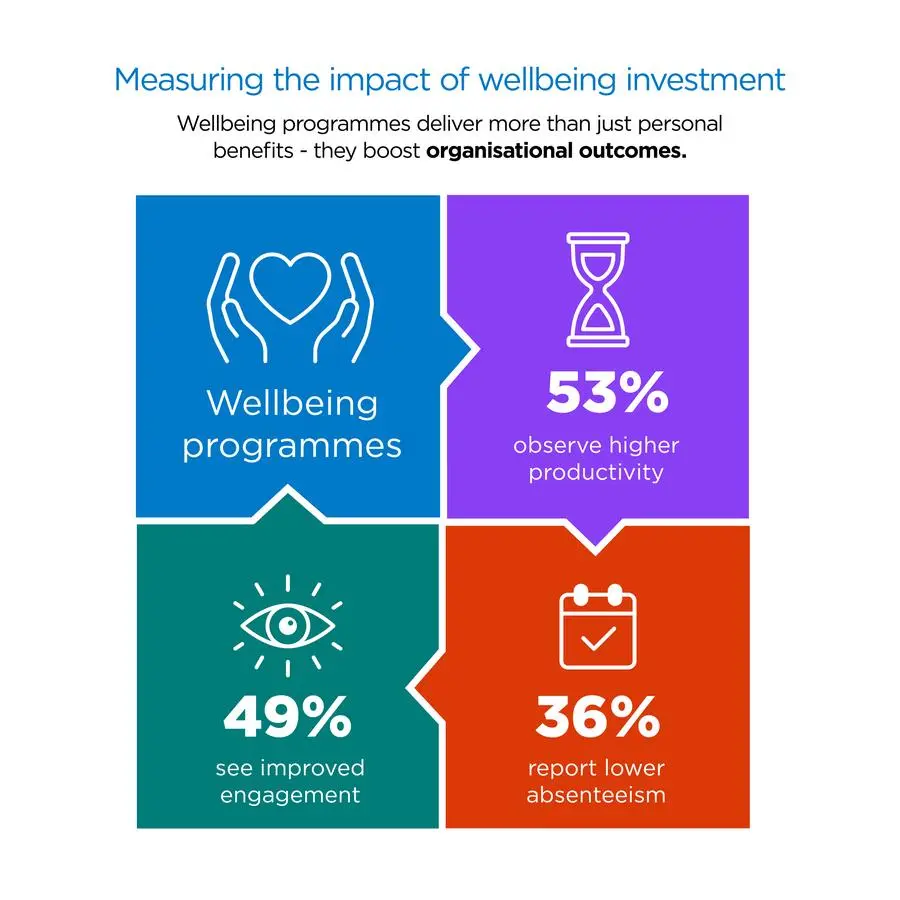Photo: Dean Pollard, General Manager, Bupa Global Middle East and Asia
A new survey by leading international healthcare management company, Bupa Global, reveals that 88% of UAE companies are planning to increase their investment in employee wellbeing programmes over the next year, driven by a clear Return on Wellbeing Investment (ROWI). Wellbeing initiatives, shown to significantly boost employee productivity, engagement, and retention, are becoming crucial drivers of organisational success. A notable 94% of senior leaders have reported that wellbeing programmes enhance productivity, underscoring the direct impact of health investments on overall business performance.
Dean Pollard, General Manager, Bupa Global Middle East and Asia commented, “Our specially commissioned Return on Wellbeing Investment (ROWI) survey is a clear indicator that prioritising employee health is not only beneficial for individuals but also a strategic move for businesses. When companies invest in holistic wellbeing initiatives, they experience tangible health returns — both in terms of reduced employee absenteeism and improved engagement and performance. Wellbeing programmes are no longer a luxury but a necessary investment to foster a healthier, more resilient workforce, ultimately driving business success.”
The ROI of wellbeing initiatives: higher productivity, reduces absenteeism, and lower turnover rates
The survey offers compelling evidence that wellbeing programmes provide substantial returns on wellbeing investment. More than half (53%) of the senior leaders surveyed reported significant improvements in productivity after adopting these initiatives. Additionally, nearly half (49%) of the employers observed greater employee engagement, and 36% noted a reduction in absenteeism.
These findings demonstrate that wellbeing programmes do more than just support personal health — they directly influence business performance. In fact, nearly a third (29%) of organisations reported lower employee turnover rates, illustrating that wellbeing is not only about workforce retention but also a tool for sustained organisational success.
With wellbeing now seen as a critical element of business success, 93% of employers consider it a core part of their strategy, reflecting the growing importance of health-driven initiatives in fostering competitiveness and organisational performance.
Rising commitment to wellbeing: nearly nine in ten UAE employers plan to increase budgets
While the benefits of wellbeing initiatives are clear, challenges remain in their implementation. Nearly half (45%) of senior decision-makers cited low employee participation as a barrier, and 43% identified budget constraints as a limiting factor obstacle.
Looking ahead however, the commitment to wellbeing is clear, as nearly nine in ten employers (88%) plan to increase their investment in these programmes over the next year. Notably, more than one in five (22%) organisations anticipate raising their wellbeing budgets by over 15%, reflecting a strong drive to foster healthier, more engaged workforces and recognising the long-term value this brings.
Wellbeing programmes enhance employee satisfaction and work-life balance
From the employees’ perspective, wellbeing programmes make a noticeable difference. An impressive two-thirds (66%) of employees expressed satisfaction with their company’s wellbeing offerings, particularly favouring flexible work policies, health workshops, and maternity and parental leave programmes. These initiatives not only address employees’ needs but also contribute to a more health-conscious and supportive work culture.
As a result of these efforts, a majority (60%) of employees reported improvements in their work-life balance, while nearly half (47%) noted better overall health. Initiatives such as health screenings and wellness workshops were seen to reduce health risks and promote a balanced work environment. Employees also saw direct benefits, with 41% reporting increased motivation. Meanwhile, over a third (36%) experienced reduced stress, highlighting the far-reaching advantages of these initiatives.

Three in four UAE employees prioritise expanded insurance benefits
As the conversation around workplace wellbeing evolves, employees are no longer viewing these programmes as perks but as essential components of their overall job satisfaction and health. This shift in expectations has placed greater pressure on employers to offer more comprehensive support.
A large majority (89%) of employees are prioritising expanded insurance benefits, reflecting a demand for greater security and access to care. Additionally, 88% advocate for access to more wellbeing tools including frequent health screenings, and over four in five (85%) express a strong desire for improved mental health resources, resources — a clear indication that holistic health, including mental wellbeing, has become a priority.
Flexible working arrangements also remain a top priority, with 85% of employees seeking these policies as part of their wellbeing packages. The emphasis on flexibility reflects the modern workforce’s desire for balance and autonomy, enabling employees to better manage both their professional and personal lives.
93% of UAE employees prioritise wellbeing initiatives as part of their job search
As the focus on employee wellbeing becomes a central part of workplace culture, employees are increasingly seeking organisations that prioritise their health and overall job satisfaction. Companies that offer attractive wellbeing programmes are setting themselves apart in a competitive job market.
In fact, wellbeing initiatives are influencing job-seeking behaviour, with 93% of employees considering them an important element when evaluating potential employers. This highlights the critical importance for companies to invest in wellbeing initiatives to attract and retain top talent.
Mr. Pollard added, “The future of employee wellbeing is one of growth and innovation. Businesses are realising that investing in the health and wellbeing of their workforce is a key driver of organisational performance and engagement. At Bupa, we’re advancing this through platforms like Blua, which offers convenient access to virtual doctor appointments, digital health programmes, and remote healthcare services. Our Return on Wellbeing Investment (ROWI) survey emphasises that such modern healthcare solutions are not just desirable but essential, highlighting their crucial role in enhancing employee wellbeing and driving business success.”
Bupa Global and Sukoon Insurance have partnered to offer premium international health insurance plans tailored for the UAE. Sukoon, as the insurer, brings regional expertise, while Bupa Global, as the international administrator, provides seamless access to global healthcare services. This collaboration ensures UAE customers receive extensive, high-quality coverage, combining local knowledge with world-class healthcare solutions.
In partnership with Sukoon, Bupa Global is further exploring the findings of the Return on Wellbeing Investment (ROWI) survey during the HRSE (HR Summit & Expo) at the Dubai World Trade Centre on 23rd and 24th October 2024. As proud sponsors of HRSE, they are sharing key insights into the impact of comprehensive wellbeing programmes on employee performance and organisational outcomes.

